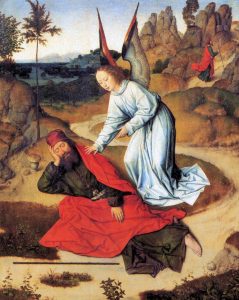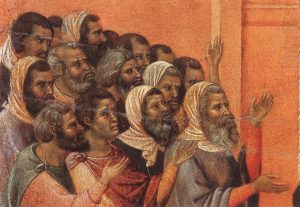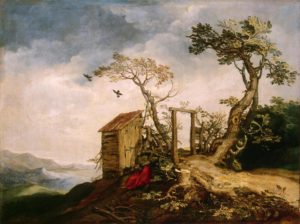Thoughts on Sunday’s Lessons for Aug. 11, 2024 (Pentecost 12B/Proper 14)

The Prophet Elijah in the Desert (1464-1468), oil painting on panel by Dieric Bouts the Elder (1420-1475). Panel in an altarpiece at Sint-Pieterskerk, Leuven, Belgium. (Click image to enlarge.)
First Reading (Track One): 2 Samuel 18:5-9, 15, 31-33
The child born of David’s rape of Bathsheba has died, as God foretold through the prophet Nathan; and now in our Track One first reading we hear of the death of David’s son Absalom. In wildly dysfunctional dynamics of a Bronze Age royal family, Absalom had killed his half-brother, Amnon, for raping their sister, Tamar. Then Absalom went to war against his father, fighting to take over Israel’s throne. David’s soldiers find Absalom trapped in a tree, and kill him despite David’s command to deal with him gently. In spite of his son’s treasonous rebellion, David grieves him deeply. “O my son Absalom, my son, my son Absalom! Would that I had died instead of you, O Absalom, my son, my son!”
First Reading (Track Two): 1 Kings 19:4-8
God provides physical and spiritual sustenance in time of trouble: This theme continues in this week’s Lectionary readings. In our Track Two first reading we find the Prophet Elijah pursued by an angry Queen Jezebel. Elijah is depressed, unwilling to get up or to eat. He goes to sleep under a broom tree and in despair asks God to take his life. God sends an angel, instead, who tempts Elijah with hot cakes and water and caring support, giving him strength to go on with his prophetic call.
Psalm (Track One): Psalm 130
We often hear this Psalm of faithful hope in God; indeed, it has been only a few weeks since the last time it appeared in the Lectionary! In the context of different readings, though, we may sense its verses in new and different ways. On June 29 we heard it alongside David’s grief at the death of his friend, Jonathan. Now we sing it in harmony with David’s grief over his son Absalom’s death. God’s love and grace wait for us even when we are deep in grief. We wait for God, even as in night’s darkest hours we wait for morning light.
Psalm (Track Two): Psalm 34:1-8
We will read Psalm 34 in three parts over this and the next two Sundays. A Psalm of praise and thanksgiving for God’s protection in time of trouble, it is held in tradition as a hymn sung by King David after he escaped from a threatening situation in warfare. This opening portion includes an unusual sensory metaphor that has been adopted in a contemplative Taizé chant: The Psalmist tells us to “taste and see” that God is good when we are thankful for God’s protection. Happy are those who trust in God!
Second Reading: Ephesians 4:25-5:2
“Do not let the sun go down on your anger.” In its life lessons for those who lived in community in the early church, this passage from the letter to the people of Ephesus speaks good sense to us all: Tell the truth. If you’re angry with your neighbor, work it out; don’t let anger divide you. Don’t steal. Work honestly, and share with those in need. Be honest, but be positive. Be gracious. Forgive one another. And at the end of the day, love each other as Jesus loves us, and try to live as Jesus would have us live.
Gospel: John 6:35, 41-51
We gain a sense of continuity through repetition in Sunday’s Gospel. Once again we hear the beloved verse that concluded last Sunday’s reading, now as the first verse of the Gospel: “I am the bread of life. Whoever comes to me will never be hungry, and whoever believes in me will never be thirsty.” Now, though, the mood of the crowd following Jesus changes, and people start pushing back. They know Jesus. They know his parents. They watched him grow up. Who is he to be talking like this? But Jesus stands firm, and will continue to do so as we continue through John’s extended exposition of Jesus as manna, the bread of life.


